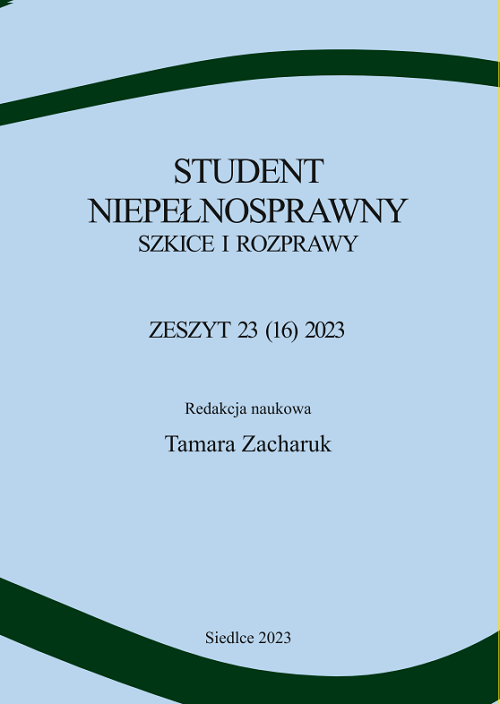Artificial intelligence as a mean of supporting inclusive education
DOI:
https://doi.org/10.34739/sn.2023.23.01Keywords:
sztuczna inteligencja, edukacja włączająca, uczeńAbstract
Artificial Intelligence is a field of computer science that focuses on creating programs and computer systems capable of performing tasks that require human intelligence. It involves researching and defining the rules governing intelligent human behaviors and applying them in algorithms and programs. Artificial Intelligence's objective is to solve problems, make decisions, learn from data, understand natural language, process images and sounds, among many other capabilities. It is divided into various categories, such as weak AI, strong AI, machine learning, neural networks, and general artificial intelligence. AI has a tremendous impact on various aspects of human life, including industry, transpor-tation, medicine, commerce, agriculture, and education. In education, AI can support students through personalized learning, adaptive learning, speech and text recognition, assistive technologies, identification of students' weaknesses, as well as fostering collabora-tion and communication. The implementation of AI in inclusive education can provide more effective teaching methods, tailor the learning process to individual students' needs, and support students with various difficulties in fully participating in the educational process. However, there are also risks involved, such as a potential lack of critical thinking and empathy in students, as well as dependency on technology, which requires attention and appropriate remedial action.
Downloads
References
Al-Khamisy D. (2016), Nauczyciele wobec dylematu za czy przeciw inkluzji, [w:] L. Pytka, T. Zacharuk, M. Wiśniewska (red.), Perspektywy i doświadczenia edukacji inkluzyjnej, Wydawnictwo UPH w Siedlcach, Siedlce, s. 29-43.
McCarthy J., Heyes P.J. (1969), Some philosophical problems from the standpoint of artificial intelligence, [w:] B.L. Webber, N.J Nilsson (red.), Readings in artificial intelligence, Morgan Kaufmann Publishers.
Różanowski, K. (2007), Sztuczna inteligencja: rozwój, szanse i zagrożenia „Zeszyty Naukowe Warszawskiej Wyższej Szkoły Informatyki”, nr 2, s. 109-135.
Skałbania B., Babiarz M. (2018), Edukacja włączająca jako przestrzeń dla rozwoju czy ryzyko wykluczenia i marginalizacji ucznia?, „Student Niepełnosprawny. Szkice i Rozprawy”, nr 18(11), s. 17-27.
Sobczak S., Gaik B. (2015), Edukacja inkluzyjna jako proces edukacyjno-wychowawczy realizowany w szkole w interpretacji pedagogiki ponowoczesnej, [w:] L. Pytka, T. Zacharuk (red.), Èlan vital w edukacji inkluzyjnej i profilaktyce kreatywnej, Wydawnictwo UPH w Siedlcach, Siedlce, s. 217-226.
Stylec-Szromek P. (2018), Sztuczna inteligencja – prawo, odpowiedzialność, etyka, „Zeszyty Naukowe Politechniki Śląskiej, Seria: Organizacja i Zarządzanie”, z. 123, s. 501-509.
Zacharuk T. (2008), Wprowadzenie do edukacji inkluzyjnej, Wydawnictwo Akademii Podlaskiej, Siedlce.
Downloads
Published
How to Cite
Issue
Section
License
Copyright (c) 2023 Disabled Student. Sketches and Theses

This work is licensed under a Creative Commons Attribution-NonCommercial-NoDerivatives 4.0 International License.




